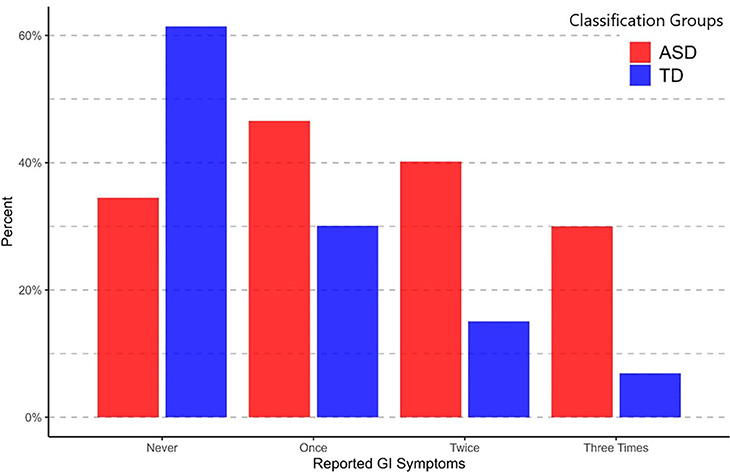Children diagnosed with autism are far more likely to experience ongoing gastrointestinal (GI) problems than their typically developing peers. That's the finding of a new UC Davis MIND Institute study published in Autism. The research also found that these stomach and digestive issues are linked to greater challenges with sleep, communication, sensory processing and behavior.
The study followed 475 children between the ages of 2 and 12, including 322 children with autism and 153 with typical development. Families participated in detailed physician-led interviews at multiple time points. This allowed researchers to track both the frequency and persistence of gastrointestinal symptoms throughout childhood.
The findings show that autistic children were not only more likely to report GI problems, but they were also more likely to have multiple symptoms at once. It was also more likely for these symptoms to persist over many years. Importantly, these symptoms often did not have an identified medical cause. This highlights the need for clinicians and families to pay closer attention to children's overall health and well-being.
"The connection between autism and gut symptoms has not been fully understood. Parents often sense that their child is having digestive issues, but can't tell what is causing them," said Bibiana Restrepo, the lead author of the study. She is a developmental pediatrician and a professor in the Department of Pediatrics. "Our research shows that these symptoms are common, persistent, and can affect many areas of a child's daily life. By identifying and treating them, we may be able to improve both physical comfort and developmental outcomes."
Stomach problems beyond digestion
Researchers evaluated nine common gastrointestinal symptoms, including constipation, diarrhea, abdominal pain and bloating. While occasional digestive issues are common in all children, the study revealed striking differences between groups.
- Children with autism had more GI symptoms at every age studied.
- They were more likely to experience multiple GI symptoms at the same time.
- Their GI symptoms were more likely to persist across childhood, rather than resolve quickly.
These symptoms were strongly associated with other health and behavioral challenges. Children with more frequent GI issues also showed higher rates of:
- Sleep difficulties
- Anxiety
- Irritability
- Communication challenges
- Sensory sensitivities
- Repetitive behaviors
"This is a reminder that the brain and the body are deeply connected," said the study's senior author Christine Wu Nordahl. Nordahl is a professor of psychiatry and behavioral sciences and directs the Autism Phenome Project at the MIND Institute. "When children are experiencing stomach pain or other GI problems, it doesn't just affect digestion. It can influence sleep, mood, and how they interact with the world around them."

Addressing common gut issues for children with autism
Although gastrointestinal problems in autism have been reported before, this study is the first analysis of GI symptoms in autistic kids from early to middle childhood. It is also among the largest and most rigorous to track these symptoms over a decade of childhood development.
The researchers emphasize that many GI symptoms are treatable, even when they don't have an obvious medical diagnosis. Increased awareness among clinicians, educators and families can help ensure children get the care they need.
"For parents, this study validates what many have long observed: that GI symptoms are very common in children with autism," Restrepo said. "Clinicians should ask about these issues in routine visits, because effective treatment may help children feel better and thrive."
The team hopes their findings will lead to greater collaboration between pediatricians, gastroenterologists and autism specialists. By addressing GI health as part of comprehensive autism care, children may gain relief from symptoms that interfere with their growth and development.
"This is not about finding a single cause," Nordahl added. "It's about recognizing the whole child. Supporting gastrointestinal health is one important step toward improving overall quality of life for children with autism."
This study was funded by the National Institute of Mental Health and the UC Davis MIND Institute. It was also supported by the MIND Institute Intellectual and Developmental Disabilities Research Center.






